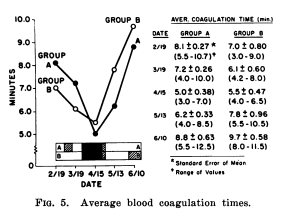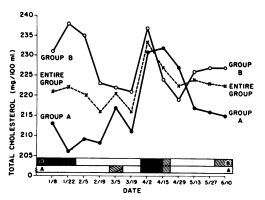
A friend of mine passed an article to me from The Wall Street Journal. It was an article about how stress raises cholesterol. My initial mental reaction was, ‘Duh, what have I been talking about for the past 10 years?’ Teaching moment: Pride comes before the fall.
I was all proud of myself that I was ahead of the curve from a major publication. As I looked for the references in The Wall Street Journal article, one was from back in 1958. This information that lifestyle (not just bad bugs, bad luck, or bad genes) affects health outcomes was being quantified 20 years before I was born. More specifically, they were looking at how stress affects cholesterol and blood clotting.
The 1958 study was titled ‘Changes in the Serum Cholesterol and Blood Clotting Time in Men Subjected to Cyclic Variation of Occupational Stress.’ It is published in the journal Circulation by the American Heart Association. The intro to the study states the following:
Accountants were selectively chosen as a self-controlled group for studying effects of cyclic occupational stress upon serum cholesterol and blood clotting time, since their routine work schedule is interrupted by urgent tax deadlines, associated with severe occupational stress. Forty male accountants (age 28 to 56) were bled biweekly for serum cholesterol and monthly for blood clotting time from January to June 1957. Complete records also were kept of weight, exercise, diet, relative work load, and any exposure to unusual avocational stress. When studied individually, each subject’s highest serum cholesterol consistently occurred during severe occupational or other stress, and his lowest at times of minimal stress. The results could not be ascribed to any changes of weight, exercise, or diet. Marked acceleration of blood clotting time consistently occurred at the time of maximum occupational stress, in contrast to normal blood clotting during periods of respite. The possible implications of these results are discussed in relation to the problem of clinical coronary artery disease.

In the chart above, group A are ‘tax’ accountants. Group B is made up of ‘corporate’ accountants. These are plots of cholesterol levels tested in 2 week intervals from January to June. Of particular interest is that the corporate accountants had higher cholesterol levels and a higher reported stress level in January than in April. But overall, it’s evident the spike in cholesterol correlates with the as the April 15 tax deadlines.

In the chart above, the groups are the same as the first chart. This one is testing how fast blood coagulates (clots) in monthly intervals. Again, look how mush faster this occurs at the peak of tax deadlines for these accountants. Also notice that for both groups, when the main stressor is removed, cholesterol levels dip and blood clotting normalizes.
[bctt tweet=”Chronic anger is just as damaging as eating Twinkies. Sitting all day is just as damaging as being socially isolated. Find the origin, find the solution.”]
There’s a ton of wisdom that can be extracted from these 2 charts.
Functional Medicine Wisdom
There’s a growing group of traditionally trained healthcare practitioners from medical doctors, chiropractors, osteopaths, dentists, psychologists, psychiatrists, and nutritionists that recognize the disconnect between treating symptoms and long term health outcomes. Instead of focusing on symptoms and organs, they are turning their assessment efforts to systems and origins.
For most, ‘functional medicine‘ is a new term. Using this study from 1958, assessing the systems and origins of what and why you have a health issue was already on the mind of researchers. In other words, the practice of functional medicine has been around before the term was. I just wonder when the financial incentive became too large to only focus on drugs and surgery as a solution.
If you’re looking for a healthcare provider, make sure they ask lifestyle questions and know the implications of them. If a doctor challenges your statement that what you eat affects mood or behavior, ask him to meet you for happy hour to have a few beers, your treat.
Ultimately your philosophy should match that of your treating provider. If not, you will have conflict that will only heighten each time you go to see that provider. As a result, both your and your doctor’s cholesterol will rise.
My basic philosophy is that the body has been created as a self healing, self regulating organism. When there are interferences to that ability, then the body will not recover and repair sufficiently and efficiently. Symptoms are just your body’s way of telling you there is an interference and serves you by affording you enough time to escape those interferences. Those interferences can be physical, chemical, emotional, social, and spiritual. It doesn’t matter the interference, the body reacts the same way. Chronic anger is just as damaging as eating Twinkies. Sitting all day is just as damaging as being socially isolated. Find the origin, find the solution.
Symptom Treatment Wisdom
This study reminds me of the documentary ‘Supersize Me.’ The main character decides to eat at the golden arches every meal of every day for 30 days. If he is asked to ‘super size’ his meal, he has to say yes. He also has to try every item on the menu at least once. Prior to this experiment, he gets a full checkup with labs and body composition, etc. He also had to limit is daily physical activity drastically.
About 2/3 into the experiment, the dude is feeling like crap. His energy is shot, his sex drive is in the tank, his mental clarity is fading and when labs were run, his liver enzymes were off the charts. The docs he was working with told him to stop the experiment immediately, since he knew the direct cause.
Had the main guy gone into any other traditionally trained doc, he would have probably left the office with a 3-5 prescriptions instead of having a conversation about his lifestyle choices that were damaging his health.
Imagine these accountants, especially the tax accountants, going to their doctor every year January when their stress levels were lowest. The yearly tests would all come back normal and glowingly positive. Imagine this happened for 10 straight years and then on year 11, the tax accountant goes in for his yearly checkup on April 2. The doc would look at those results and freak because ‘he had been so healthy’ the previous 10 years.
The accountant’s height, weight, eating, and exercise regime hasn’t changed. Since there’s no glaring event that would spike cholesterol, so it gets blamed on genetics. ‘Here, take Lipitor, baby Aspirin, and some Prevacid…for the rest of your life.’
Remember, symptoms are the indicator light that there is an interference to the body’s ability to heal and self regulate and arise to buy you enough time to escape the stressor. By treating those symptoms, the root cause was never addressed and you just lowered your ability to escape. You may feel better as you die quicker.
Health Promotion Wisdom
These accountants had circumstantial stress that resided around a deadline. I would say the majority of us have seasons like this. The problem is what is happening in between seasons of deadlines? My generation is really good at filling up that time with other deadlines. You may know this as being busy.
In his book Addicted to Busy by Brady Boyd, he says that almost all the problems that he counsels people on are issues of being busy. Busyness comes down to going too fast, in too many directions, for too long.
Busyness shifts your nervous system. In order to go fast, you have to use your sympathetic nervous system. This is the side of your nervous system that helps you escape angry bears. Your body treats an angry bear just like a tax deadline. Cholesterol will increase and blood clotting factors will increase. Blood sugars spike, which sets the stage for insulin resistance. Hormones like thyroid, estrogen, progesterone, and testosterone deplete. Inflammation goes up and the whole cycle repeats.
When the stressful event was gone, the accountant’s blood values leveled off. By constantly adding demand after demand to our lives, this not only won’t allow the body to recover but it starts to shift your baseline values to a new set point. This is called allostatic load. Because you have placed so many demands on yourself, the body regulates new baseline values to be able to handle the anticipation of new demands. As a result, cholesterol, blood pressure, blood clotting, blood sugar, etc start creeping up consistently. It’s only a matter of time before the body can’t keep up anymore.
When you go too fast, for too long, in too many directions, you either crash or burn out.
One of the biggest bangs for your buck in your health promotion journey to regulate allostatic load is to break busy. The fastest way to break busy is to be comfortable with this simple little, 2 word response.
No.
If this is a new word to you, then come hang out at my house. I have a 4 year old and a 2 year old that can teach you this word in many tones and temperaments.
Stop trying to be all things to all people. It’s not a matter if you can do everything but if you should do everything.
This is especially applicable to leaders in service industries like accounting. Serving other people to the point of devastating distractions (like addictions or affairs) or developing illness will leave you with the ability to serve no one. If you’re not going to eliminate the potential stress and anxiety triggers than you have to change your relationship to it. You have to break busy before busy breaks you.
I know it’s easier said than done but here are some tips that we implement as a family to break busy. Need additional help? You know how to find me.


0 Comments